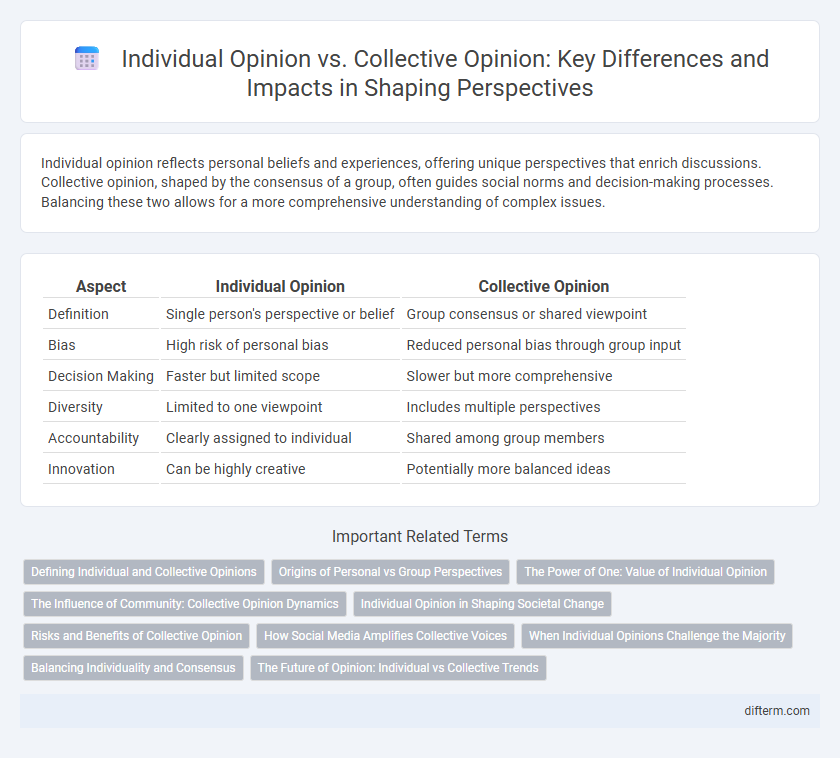Individual opinion reflects personal beliefs and experiences, offering unique perspectives that enrich discussions. Collective opinion, shaped by the consensus of a group, often guides social norms and decision-making processes. Balancing these two allows for a more comprehensive understanding of complex issues.
Table of Comparison
| Aspect | Individual Opinion | Collective Opinion |
|---|---|---|
| Definition | Single person's perspective or belief | Group consensus or shared viewpoint |
| Bias | High risk of personal bias | Reduced personal bias through group input |
| Decision Making | Faster but limited scope | Slower but more comprehensive |
| Diversity | Limited to one viewpoint | Includes multiple perspectives |
| Accountability | Clearly assigned to individual | Shared among group members |
| Innovation | Can be highly creative | Potentially more balanced ideas |
Defining Individual and Collective Opinions
Individual opinion reflects a person's personal beliefs, values, and experiences, offering unique perspectives that contribute to diversity in thought. Collective opinion emerges from shared beliefs within a group, shaped by social norms, cultural backgrounds, and communal goals, often representing a consensus or dominant viewpoint. Understanding the distinction between individual and collective opinions is essential for analyzing social dynamics and decision-making processes.
Origins of Personal vs Group Perspectives
Personal opinions originate from individual experiences, cognitive biases, and unique emotional responses, shaping distinct perspectives. Collective opinions emerge through social interactions, shared cultural norms, and group dynamics, often influenced by majority consensus and social conformity. Understanding the origins of these perspectives highlights the interplay between personal identity and societal influence in opinion formation.
The Power of One: Value of Individual Opinion
The power of one lies in the unique perspective and innovation that individual opinions bring to the collective discourse, often sparking change and challenging the status quo. Individual opinions drive progress by introducing novel ideas that can influence social movements, policy reforms, and cultural shifts. Valuing personal viewpoints promotes diversity of thought, which is essential for democratic engagement and effective problem-solving.
The Influence of Community: Collective Opinion Dynamics
Collective opinion dynamics shape individual beliefs by creating social norms that guide perceptions and behaviors within a community. The constant interaction among community members leads to a reinforcement of shared values and consensus, often outweighing solitary viewpoints. Social influence theories highlight how conformity pressures and information exchange drive the evolution of collective opinions over time.
Individual Opinion in Shaping Societal Change
Individual opinion plays a crucial role in shaping societal change by challenging established norms and introducing innovative ideas that inspire collective action. Personal convictions often act as catalysts for movements, influencing public discourse and driving legislative reforms. The diversity of individual perspectives fosters a dynamic environment where progressive social transformations emerge from grassroots efforts.
Risks and Benefits of Collective Opinion
Collective opinion can lead to more comprehensive decision-making by incorporating diverse perspectives and reducing individual biases, thereby enhancing the accuracy and reliability of conclusions. However, it poses risks such as groupthink, where conformity pressure suppresses dissenting views and critical thinking, potentially resulting in flawed or suboptimal outcomes. Balancing individual insights with collective consensus is essential to mitigate risks and maximize the benefits of shared viewpoints.
How Social Media Amplifies Collective Voices
Social media platforms exponentially amplify collective opinions by enabling instantaneous sharing and viral spread of ideas, transforming individual voices into powerful communal movements. Algorithms prioritize popular content, reinforcing group narratives and often overshadowing nuanced individual perspectives. This amplification reshapes public discourse, intensifying community influence on social attitudes and decision-making processes.
When Individual Opinions Challenge the Majority
Individual opinions that challenge the majority foster critical thinking and drive social progress by questioning established norms and encouraging diverse perspectives. Dissenting viewpoints often reveal overlooked issues, prompting re-evaluation of collective beliefs and policies. These challenges are essential for democracy, ensuring decisions reflect a broader range of experiences and values.
Balancing Individuality and Consensus
Balancing individuality and consensus requires recognizing the value of diverse perspectives while fostering shared understanding and cooperation. Individual opinions drive innovation and personal expression, but collective opinion ensures stability and harmonious decision-making. Effective communication and empathy are essential to navigate conflicts and integrate unique viewpoints into cohesive solutions.
The Future of Opinion: Individual vs Collective Trends
Individual opinion reflects personal experiences and unique perspectives that drive innovation and social change, while collective opinion often represents consensus shaped by cultural norms and shared values. The future of opinion is likely to balance these dynamics, leveraging technology to amplify diverse individual voices within collective frameworks for more inclusive decision-making. Emerging platforms utilizing AI and data analytics enable real-time aggregation and nuanced understanding of both individual and collective sentiments, reshaping how societies form opinions.
individual opinion vs collective opinion Infographic

 difterm.com
difterm.com